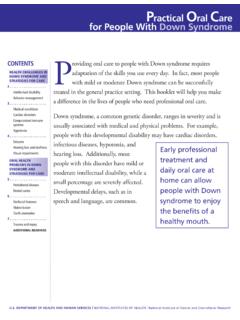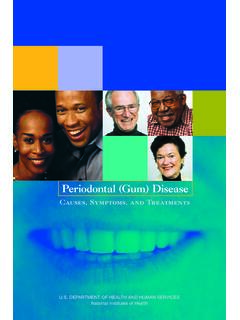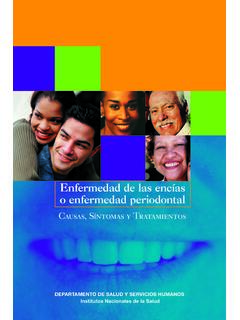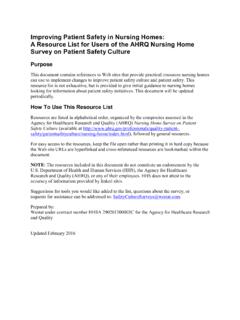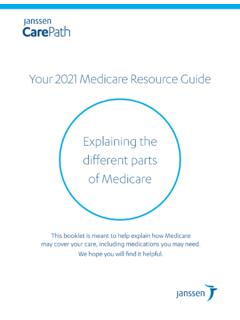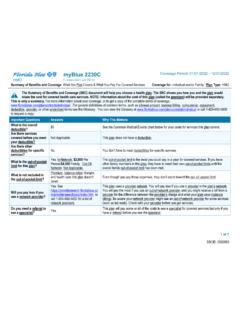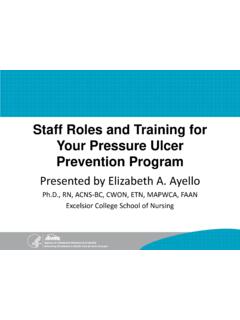Transcription of of Cancer Treatment Dental Provider’s Oncology
1 Dental provider s Oncology Pocket GuidePrevention and management of oral complicationsHead and Neck Radiation TherapyChemotherapyHematopoietic Stem Cell TransplantationDental care for Oral Complications of Cancer TreatmentOral Mucositis: Culture lesions to identify secondary infection. Prescribe topical anesthetics and systemic analgesics. Consult the oncologist about prescribing antimicrobial agents for known infections. Have the patient avoid rough-textured foods and report oral problems early. Xerostomia/salivary gland dysfunction: Advise the patient to soften or thin foods with liquid, chew sugarless gum, or suck ice chips or sugar-free hard candies. Suggest using commercial saliva substitutes or prescribe a saliva changes: Refer to a enamel: Advise the patient to rinse the mouth with water and baking soda solution after vomiting to protect Specific to ChemotherapyNeurotoxicity: Provide analgesics or systemic pain relief.
2 Bleeding: Advise the patient to clean teeth thoroughly with a toothbrush softened in warm water; avoid flossing the areas that are bleeding but to keep flossing the other Specific to Radiation Demineralization and radiation caries: Prescribe daily fluoride gel applications before Treatment starts. Continue for the patient s lifetime if changes in quality or quantity of saliva fibrosis: Instruct the patient on stretching exercises for the jaw to prevent or reduce the severity of : Avoid invasive procedures involving irradiated bone, particularly the mandible. Consult the oncologist about scheduling Dental Treatment . Schedule oral surgery at least 7 to 10 days before myelosuppressive therapy begins. Prevent tooth demineralization and radiation caries: Instruct the patient in home application of fluoride gel (not fluoride rinses).
3 Instruct the patient about an oral hygiene regimen. After TransplantationConsult the oncologist before any Dental procedure, including prophylaxis. Monitor the patient's oral health for plaque control, tooth demineralization, Dental caries, and infection. Watch for infections on the tongue and oral mucosa. Herpes simplex and Candida albicans are common oral infections. Delay elective oral procedures for 1 year. Follow patients for long-term oral complications. Such problems are strong indicators of chronic graft-versus-host disease. Monitor transplant patients carefully for second malignancies in the oral region. Advice for Your PatientsBrush teeth, gums, and tongue gently with an extra-soft toothbrush and fluoride toothpaste after every meal and at bedtime.
4 If brushing hurts, soften the bristles in warm water. Floss teeth gently every day. If your gums bleed and hurt, avoid the areas that are bleeding or sore but keep flossing your other instructions for fluoride gel applications. Questions To Ask the Medical OncologistWhat is the patient s complete blood count, including absolute neutrophil and platelet counts?If an invasive Dental procedure needs to be done, are there adequate clotting factors?Does the patient have a central venous catheter? What is the scheduled sequence of treatments so that safe Dental Treatment can be planned?Is radiation therapy also planned? Questions To Ask the Radiation OncologistWhat parts of the mandible/maxilla and salivary glands are in the field of radiation?
5 What is the total dose of radiation the patient will receive, and what will be the impact on these areas?Has the vascularity of the mandible been previously compromised by surgery?How quickly does the patient need to start radiation Treatment ?Will there be induction chemotherapy with the radiation Treatment ?Hematopoietic Stem Cell Transplantation Most stem cell transplant patients develop acute oral complications, especially patients with graft-versus-host TransplantationConduct a pretreatment oral health examination and mouthwashes containing alcohol. Rinse the mouth several times a day with a baking soda and salt solution, followed by a plain water rinse. Use teaspoon each of baking soda and salt in 1 quart of warm water.
6 Omit salt during mucositis. Try the following if dry mouth is a problem: Sip water frequently. Suck ice chips or use sugar-free gum or candy. Use saliva substitute spray or gel or a prescribed saliva stimulant if glycerin swabs. Exercise the jaw muscles three times a day to prevent and treat jaw stiffness from radiation Treatment . Avoid candy, gum, and soda unless they are spicy or acidic foods, toothpicks, tobacco products, and care for Children Children receiving chemotherapy and/or radiation therapy are at risk for the same oral complications as adults. Other actions to consider in managing pediatric patients include the following:Extract loose primary teeth and teeth expected to exfoliate during Cancer Treatment .
7 Remove orthodontic bands and brackets if highly stomatotoxic chemotherapy is planned or if the appliances will be in the radiation field. Monitor craniofacial and Dental structures for abnormal growth and development. Department of HealtH anD HUman ServiceSnational institutes of HealthNational Institute of Dental and Craniofacial ResearchPre- Cancer Treatment Oral Health Examination ObjectivesConduct evaluation 1 month, if possible, 1. before Cancer Treatment a schedule for Dental Complete invasive procedures at least 14 days before head/neck radiation therapy starts; 7 to 10 days before myelosuppressive chemotherapy. Postpone elective oral surgical procedures until Cancer Treatment is and treat sites of low-grade and 3.
8 Acute oral infections:Caries Periodontal disease Endodontic disease Mucosal lesions Identify and eliminate sources of oral trauma 4. and irritation such as ill-fitting dentures, orthodontic bands, and other appliances. Identify and treat potential oral problems 5. within the proposed radiation field before radiation Treatment patients about oral Educate patients on preventing 7. demineralization and Dental and Neck Radiation Therapy Patients receiving radiation therapy to the head and neck are at risk for developing oral complications. Because of the risk of osteonecrosis in irradiated fields, oral surgery should be performed before radiation Treatment begins. Before Head and Neck Radiation TherapyConduct a pretreatment oral health examination and prophylaxis.
9 Schedule Dental Treatment in consultation with the radiation oncologist. Extract teeth in the proposed radiation field that may be a problem in the tooth demineralization and radiation caries: Fabricate custom gel-applicator trays for the patient. Prescribe a neutral pH sodium fluoride gel or a stannous, unflavored fluoride gel (not fluoride rinses). Use a neutral fluoride for patients with porcelain crowns or resin or glass ionomer restorations. Be sure that the trays cover all tooth structures without irritating the gingival or mucosal tissues. Instruct the patient in home application of fluoride gel. Several days before radiation therapy begins, the patient should start a daily 10-minute application. Have patients brush with a fluoride gel if using trays is at least 14 days of healing for any oral surgical procedures.
10 Conduct prosthetic surgery before Treatment , since elective surgical procedures are contraindicated on irradiated bone. During Radiation TherapyMonitor the patient s oral hygiene. Oral Health, Cancer care , and YouThis guide is part of a series on managing and preventing oral complications of Cancer Treatment developed by the National Institute of Dental and Craniofacial Research in partnership with the National Cancer Institute, the National Institute of nursing Research, and the Centers for Disease Control and order this and other publications in the Oral Health, Cancer care , and You series, contact:National Institute of Dental and Craniofacial Research National Oral Health Information Clearinghouse 1 NOHIC Way Bethesda, MD 20892-3500 1 866 232 4528 Reprinted September 2009 Watch for mucositis and infection.




